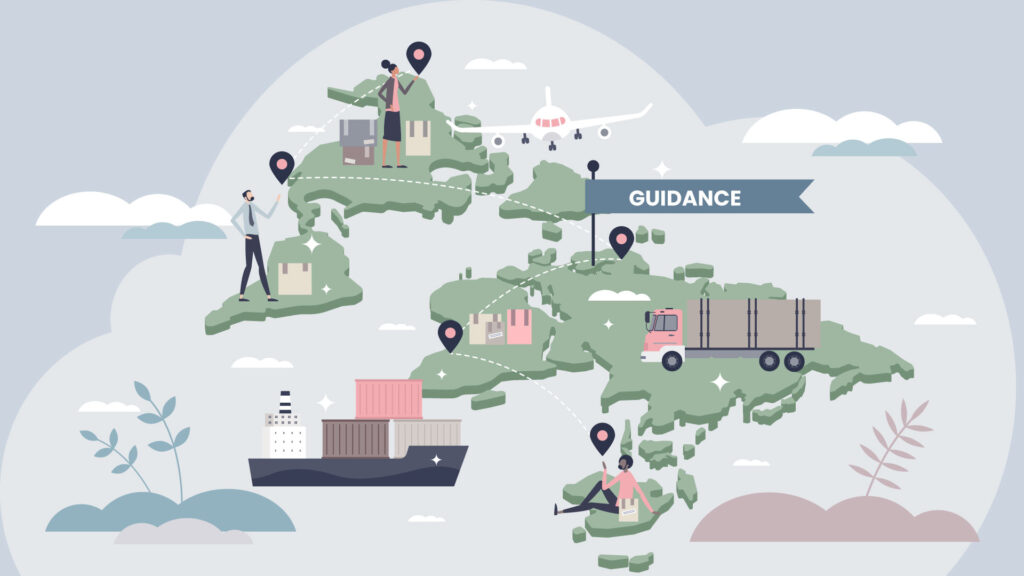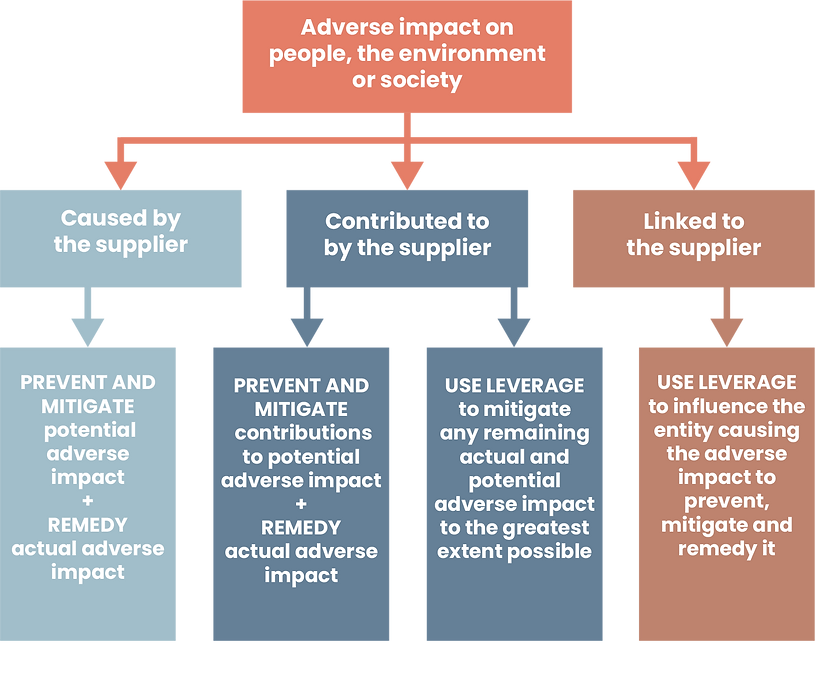Introduction to the contract clause

We explain what the contract clause is, why it exists, which international frameworks it is based on, and the extent of your responsibility. We also describe the status of upcoming legislation while providing support from international organisations and offering tips on how to get started.
Contract clause
The contract clause on due diligence for sustainable supply chains is based on the following frameworks:
- UN Guiding Principles on Business and Human Rights
- OECD Due Diligence Guidance for Responsible Business Conduct
- OECD Guidlines for Multinational Enterprises on Responsible Business Conduct
- ILO Tripartite Declaration on Multinational Enterprises and Social Policy.
When the UN Guiding Principles on Business and Human Rights were adopted in 2011, they became the first international framework for corporate human rights due diligence. Since then, both the OECD Guidelines and the ILO Tripartite Declaration, which predate the UN Guiding Principles, have been updated to align with them. The OECD has also developed its own due diligence guidance. The OECD Guidelines and the OECD Due Diligence Guidance are broader than the UN Guiding Principles, as they also cover areas such as environmental impact, corruption, and taxation.
Here is a short video about the UN Guiding Principles:
Within the scope of the contract clause on due diligence for sustainable supply chains, the concept includes identifying, assessing, preventing, mitigating, and remedying actual and potential adverse impacts on people, the environment, and society in your own operations and in your supply chains.
The contract clause is complemented by commitments in the regions’ Suppliers’ Code of Conduct, which aims to ensure that contracts are fulfilled in accordance with human rights, workers’ rights, the environment, and business ethics. The code is based on the ten principles of the UN Global Compact.
Foundation of the code of conduct
Why does the contract clause exist?
In certain cases, public buyers are required to oblige suppliers to fulfill contracts in accordance with the ILO fundamental conventions, if the work is performed under conditions where Swedish labour law does not apply. Additionally, it must be deemed necessary to impose such conditions.
Labour law conditions in procurement regulations (in Swedish)
The UN Guiding Principles on Business and Human Rights also establish that the State has a duty to protect human rights. One way that the State, at central, regional and local levels, can do this is through contract clauses on due diligence in public contracts.
Furthermore, tax funds should not be channelled to activities that violate human rights.
How is the contract clause used?
The Swedish Regions’ contract clause on due diligence for sustainable supply chains has been developed in close collaboration with the Swedish National Agency for Public Procurement and Adda Central Purchasing Body. The clause is applied to procurements of prioritised purchasing categories where the risks have been assessed as particularly high.
It is a special contract condition, meaning it does not need to be fulfilled at the time of bidding but must be met during contract execution. Unless otherwise stated, the clause takes effect when the contract comes into force.
What does the contract clause cover?
The contract clause on due diligence for sustainable supply chains includes five sections. The first three are aimed at you as a supplier, while the last two are aimed at public buyers.
- Supplier’s commitments
- Supplier’s due diligence
- Supplier’s reporting obligation
- Monitoring of the contract clause
- Management of deviations from the contract clause
You need to familiarize yourself with all five sections to know what your obligations are.
What responsibilities do you have?
Companies’ responsibility to respect human rights applies to all businesses regardless of size, industry, operational context, ownership, and structure. Nevertheless, how you fulfill your responsibilities may vary depending on these factors and the severity of your adverse impact. The responsibility for adverse impact also depends on whether you cause, contribute to, or are linked to the adverse impact.

Upcoming legislation
On 25 July 2024, the Corporate Sustainability Due Diligence Directive (2024/1760) entered into force. The aim of the directive is to foster sustainable and responsible coporate behaviour. It is part of the EU Green Deal and based on the UN Guiding Principles, OECD Guidelines, and related guidance.
According to the directive, member states have to transpose it into national law by 26 July 2026. One year later, the rules will start applying to the first group of companies, with full application by 26 July 2029. However, the directive is currently undergoing renegotiation as part of an omnibus regulation aimed at simplifying the Corporate Sustainability Due Diligence Directive, the Corporate Sustainability Reporting Directive, and the Taxonomy Regulation.
Read more about the directive as it currently stands on the European Commission’s website.
Corporate Sustainability Due Diligence Directive
Read more about the omnibus regulation in the European Commission’s questions and answers.
Questions and answers on simplification omnibus I and II
Support from international organisations
Here you will find free training and support from the UN, OECD, ILO, and the Ethical Trading Initiative.
UN & Shift's due diligence course
The UN Global Compact and the Office of the UN High Commissioner for Human Rights, together with the non-profit Shift, have developed the course Business and human rights: How companies can operationalize the UN Guiding Principles. The course helps you understand what human rights mean to you and how you can respect human rights in line with the UN Global Compact and the UN Guiding Principles on Business and Human Rights.
OECD due diligence courses
The OECD has a general due diligence course and three industry-specific courses:
- Essentials of OECD Due Diligence
- OECD Due Diligence for Agriculture and Seafood Supply Chains
- OECD Due Diligence for Garment and Footwear Supply Chains
- OECD Due Diligence for Electronics and Vehicle Parts Supply Chains
Council of Europe training on business and human rights
The Council of Europe course addresses the frameworks, methods and practical measures for how states, companies and lawyers can prevent, limit and redress potential or actual business-related human rights violations.
ILO responsible business course
The ILO course Responsible Business – Meeting labour standards in global supply chains helps you understand the expectations of codes of conduct. Through the course, you will explore and learn practical ways to improve compliance with international labour standards, legislation and codes of conduct.
ILO Helpdesk
The ILO also has a help-desk for companies. Contact it for support in aligning your business operations with international labour standards and building good labour relations.
Ethical Trading Initiative's access to remedy training
The Ethical Trading Initiative, together with UK Aid and Labor Solutions, has developed training on access to remediation, which follows the Ethical Trading Initiative’s Access to Remedy Principles .
Getting started
Good planning makes it easier to participate in a public procurement that requires due diligence for sustainable supply chains. Here are some steps to ensure you are well prepared.

Understand the requirements
Find out what the contract clause means for your company by using the support available here in the guidance.

Ensure that you have clear policies
Ensure that you have clear policies on human rights, workers’ rights, the environment, and business ethics for your own operations and supply chains.

Map exisiting processes
Identify which due diligence processes you already have in place and which need to be developed to meet the requirements.

Analyse the supply chain
Start mapping your supply chain and gather information on the countries and regions where your products are final assembled or manufactured.

Participate in dialogues
Communicate with the regions and other public buyers to understand their requirements and expectations.

Collaborate and certify
Investigate whether you can collaborate with other companies or industry initiatives and if there are certifications you can use. Examples can be found in the Swedish National Agency’s risk analysis service.
By working proactively, you can strengthen your competitiveness and contribute to more sustainable supply chains.
Guidance for suppliers on fulfilling the contract clause
Introduction to the contract clause
We explain what the contract clause is, why it exists, which international frameworks it is based on, and the extent of your responsibility.
Supplier’s commitments
We describe what is meant by human rights, workers’ rights, the environment, and business ethics.
Supplier’s due diligence
We explain what is included in identifying, assessing preventing, mitigating, and remedying adverse impacts.
Supplier’s reporting obligation
We clarify what you must do if you have reasonable grounds to assume that severe deviations are occurring or have occurred.